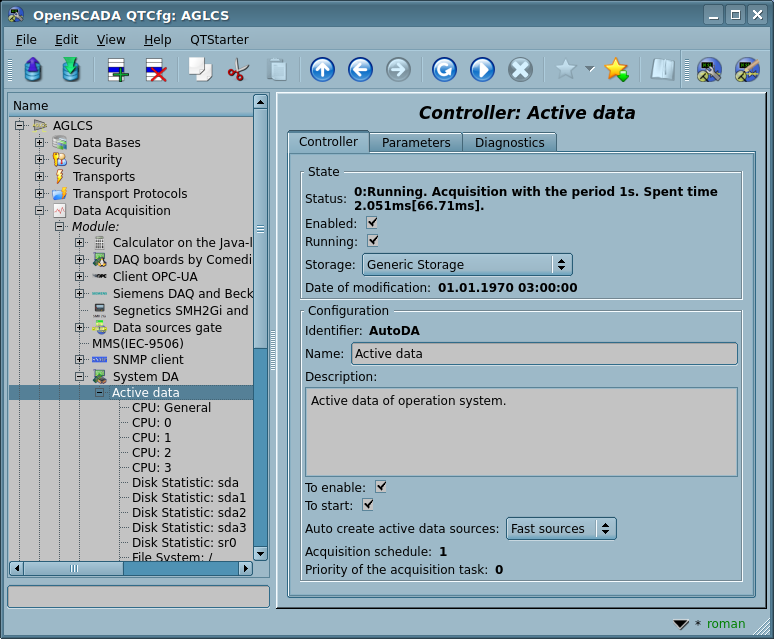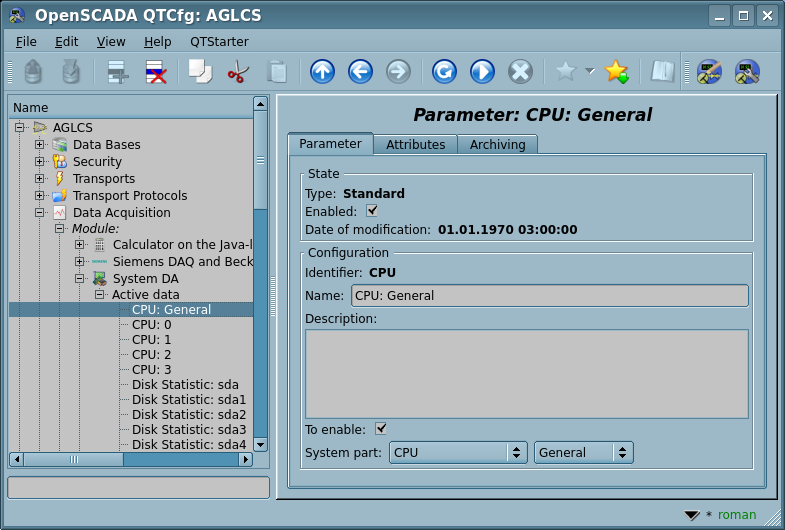| Module | Name | Version | License | Source | Languages | Platforms | Type | Author | Description |
|---|---|---|---|---|---|---|---|---|---|
| System | System DA | 3.5 | GPL2 | daq_System.so | en,uk,ru,de | x86,x86_64,ARM | DAQ | Roman Savochenko Maxim Lysenko (2009) — the page translation |
Provides data acquisition from Operation System. Supported OS Linux data sources: CPU, Memory, Sensors, Disk SMART, Disk Statistic, File System, Network, Power, UPS, Up Time etc.
|
Contents
The module is a kind of gateway between OpenSCADA and Operation System (OS) which receives data from various data sources and allows to manage some components of the OS.
The module provides an ability of automatic searching for supported active data sources with establishing the parameters for accessing to them as well as the implementation of the horizontal reservation function, that is working in conjunction with the remote station of the same level.
1 Controller object
To add a data source of OS there is created and configured a controller object in OpenSCADA. An example of the configuration tab of the controller object of the given type shown in Figure 1.
From this tab you can set:
- State of the controller object, as follows: status, "Enabled", "Running" and the storage name containing the configuration.
- Identifier, name and description of the controller.
- The state "Enabled" and "Running", in which the controller object must be translated at start up.
- Automatic searching the active data sources and creation of the parameters for them for modes: "Manual", "Fast sources", "Slow sources", "All sources".
- Policy of scheduling and priority of the data acquisition task.
- In cycle call for slow sources, to prevent of constant shunting the main cycle of fast sources.
2 Parameters
The module provides only one the "Standard (std)" type of the parameters with the parameters table name "OSPrm_{CntrId}". Additional configuration fields of the parameters of the module (Fig. 2) are:
- part of the system;
- subtype, dependent from the data source and can be missing in whole.
| Data Source (ID) "AutoCreateID" |
Subtype values | Parameter attributes (identifier[properties]) | Notes |
|---|---|---|---|
| CPU (CPU) "CPU[{N}]" |
"General (gen)" or CPU number N. |
|
Updated in the generic cycles for all attribute values and prepares the most actual CPU generic-average frequency for the root page. All CPU specific frequency values are averaged for "General (gen)" and changes there are propagated to all cores. As the sources there used:
|
| Memory (MEM) "MEM" |
Not used. |
|
As the source there used "/proc/meminfo". |
| Sensors (sensors) "Sensors" |
Not used. | Defined by sensors those are available on the hardware. For each sensor the unique attribute is created. | The library libsensors or the program mbmon is used also as the direct sensors in "/sys/devices/virtual/hwmon/*/temp" and "/sys/devices/virtual/hwmon/*/temp*". Higher priority in use is given to the library libsensors since mbmon has problems on multi-core architectures and it is deprecated mostly. |
| Process (proc) | List of commands of the processes with the possibility to specify the regular expression to the whole command-line in view "/{RE}/". |
|
As the source there is used "/proc/{PID}/status" and "/proc/{PID}/stat". |
| Qt sensor (QSensor) "{OrigName}" |
List of the Qt-sensors in their original name OrigName |
|
The source is dynamic, so the available attributes dependent from the QSensor type. Typical sensor types are: QAccelerometer, QAmbientLightSensor, QCompass, QIRProximitySensor, QLightSensor, QMagnetometer, QOrientationSensor, QProximitySensor, QRotationSensor, QTapSensor. |
| Disk SMART (hddsmart) "DiskSMART{DEV}" |
Devices DEV of disks, available in the system. | Defined by SMART-fields (also as entries of the NVMe Log), available for this disk. For each field the unique attribute is created. | It is a slow source. The source is dynamic, so the available attributes dependent from the disk type. The smartctl program must be installed and available. |
| HDD temperature (hddtemp) "Temperature_hd{DEV}" |
Devices DEV of the HDD Disks, available in the system. |
|
|
| Disk Statistic (hddstat) "DiskSt_{DEV}" |
Devices DEV of disks or their partitions, available in the system. |
|
As the sources there used:
|
| File System (fs) "FS{MP}" |
Mounted file systems MP. |
|
As the source there used "/etc/fstab" for the file systems. |
| Network (netstat) "Net_{IF}" |
Network interfaces IF, available in the system. |
|
As the source there used "/proc/net/dev" for the network devices-interfaces. |
| Power (Power) "Power{DEV}" |
Power devices DEV, available in the hardware. | Read and written all properties accessible in the device folder with specific processing of the most known ones:
|
The source is dynamic, so the available attributes dependent from the source type. As the source there used the Linux Power interface in "/sys/class/power_supply/". |
| UPS (ups) | UPS Address. | Defined by fields, provided by corresponded UPS. For each field the unique attribute is created. | That is the slow source. The source is dynamic, so the available attributes dependent from the UPS type. The upsd demon from the project NUT must be accessible in the system or network, that is not detected automatically and its address you must set directly. |
| Up Time (uptime) "UpTm_[sys|stat]" |
System (sys) or Station (stat) uptime. |
|

